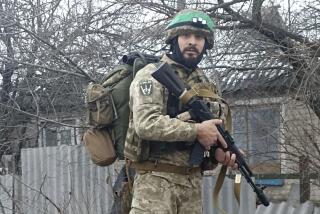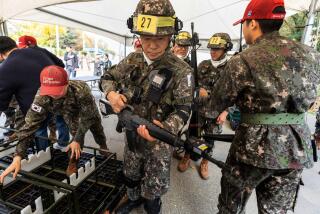Kosovo’s Ex-Rebels in No Man’s Land
- Share via
PRISTINA, Yugoslavia — When war ended in his homeland three months ago, rebel Kosovo Liberation Army fighter Ali Mustafa made a unilateral decision to disarm.
He went home.
“I decided to come back to my normal life,” Mustafa said this week during a break from his job at the combination sawmill and garage that he and his four brothers run here in the provincial capital of Kosovo. “My brothers are carpenters, and they couldn’t work without me.”
With the bulk of Mustafa’s former KLA comrades facing formal demilitarization Sunday, international peacekeepers say the reintegration of the rebel soldiers into civilian life will be a key step in the return of stability to the separatist province.
Yet, 90 days after NATO peacekeepers moved into Kosovo, about 10,700 KLA fighters remain in limbo, no longer soldiers but, for the most part, not yet regular civilians, facing lives without the jobs they once had, a clear future or even habitable homes to return to.
As many as 3,000 former KLA fighters may be absorbed into a largely weaponless “Kosovo Corps,” a national guard-style force that will begin screening applicants Monday, the day after the scheduled demobilization. The controversial U.N.-organized corps is also supposed to include 2,000 part-time members.
Several hundred more former KLA fighters are expected to become civil administrators, police officers--65 KLA members are in the first class of 200 officers being trained by U.N. personnel--firefighters and ambulance workers, all under the direction of the U.N.-run civilian administration.
That leaves half the KLA, and about 40,000 civilian dependents, without any source of income. International aid workers hope that a planned $15-million jobs program will help ease that crunch.
The guerrillas came from all sections of Kosovo life, according to a recent study--conducted by the International Organization for Migration--of 8,982 ethnic Albanians who registered with the peacekeeping mission as former KLA combatants.
And most want to resume those lives, with only 30% hoping to work as soldiers or police officers. In fact, nearly half those interviewed said they joined the KLA this year, and only one in 10 belonged to the KLA before 1998. More than one-third were unemployed when they joined, and about 24% were self-employed, including farmers, while 12% were students and 6% were teachers.
The KLA was also a young army, with 78% of the guerrillas 29 or younger. Half were single, but in a culture that embraces extended families, each former fighter helps support an average of eight other family members.
Yet in a society that has endured a decade of official oppression, the KLA has assumed a stature far beyond its limited military accomplishments.
Supporters acknowledge that, without the intercession of NATO forces, the KLA probably would have been destroyed by the Yugoslav army. Still, the rebel force is revered as freedom fighters. As such, many Albanians believe, the KLA should continue to exist.
“Kosovo needs the KLA,” said Fatmir Dobruna, a truck driver from the rural village of Lozica, between Pristina and the western city of Pec.
Dobruna and his brother Fazli form the core of an extended family of 15 who lived in two adjacent houses until ethnic Serbian paramilitary groups burned one and bulldozed the other. Now the family members live in a single ground-floor room as they try to repair the extensive damage from the fire, which gutted the house.
Dobruna said that, as he and his family fled the fighting during the war, he was stabbed twice by Serbian paramilitary fighters who also robbed him of 5,000 German marks (about $3,000) before killing six fellow villagers who had no money. Now, he said, ethnic tensions remain a danger in Kosovo, despite the presence of tens of thousands of NATO troops.
“I was driving through [the Serbian enclave of] Gracanica 15 days ago, and the Serbs threw stones and bricks and broke all the windows in my truck,” Dobruna said.
But the idea of an ethnic Albanian force in this troubled province, however defanged, angers Serbian authorities. Yugoslav and Russian officials have condemned the plan for the Kosovo Corps on grounds that it doesn’t meet the requirements for a fully demobilized KLA.
On Wednesday, officials with the NATO-led force in Kosovo, known as KFOR, insisted again that the group will be limited to working on rebuilding and responding to natural disasters. Only 200 members will be authorized to carry as-yet-unspecified weapons to provide security at corps project sites.
“This will not be a defense force--it will certainly not be an army--and will not have any role in law enforcement, riot control, counter-terrorism or any other task involved in the maintenance of law and order,” said Maj. Ole Irgens, a KFOR spokesman.
But many ethnic Albanians, including key members of the self-declared, KLA-dominated Kosovo provisional government, see the corps as part of a transition to a military for a future free Kosovo.
“In five years, Kosovo will be independent, and it will have a military like every other country,” said Mehmet Hajrizi, deputy prime minister in the provisional government.
Rexhep Selimi, a former KLA fighter and now the provisional government’s minister of public order, said the only way to ensure Kosovo’s future stability is to split it off from Yugoslavia. Kosovo is a province of Serbia, the dominant Yugoslav republic.
“No other solution is possible,” he said. “I believe in the future that independent Kosovo will have an army. The Kosovo Corps could be converted into an army if in the future it is decided it is necessary.”
KFOR officials, however, insist that Kosovo Albanians will have to be satisfied with living under the protection of the North Atlantic Treaty Organization, which officially considers Kosovo still to be under Yugoslav sovereignty.
“Any sort of quasi-military force is not acceptable to the international community at this point,” said James Kenney, spokesman for the U.S. mission in Kosovo. “What they have to come to terms with is that in the short term and the long term, the security of Kosovo is going to be provided by KFOR.”
Irgens said peacekeepers will react “robustly” if KLA soldiers try to continue as a fighting force after Sunday despite their agreement with NATO forces to dissolve.
“Any attempts by [the KLA] in forming any military or paramilitary group in Kosovo will be seen as noncompliance and be treated as such,” including with arrests and confiscation of weapons, he said.
But even Pec’s sole Roman Catholic priest, a rare figure in a culture dominated by Muslim Albanians and Orthodox Serbs, fears the future without some form of the KLA.
“If the KLA is demilitarized, then the problems will start all over again,” Father Albert Krista said. “If Kosovo goes back to the state it was before [as part of Yugoslavia], then the paramilitaries will emerge again.”
More to Read
Sign up for Essential California
The most important California stories and recommendations in your inbox every morning.
You may occasionally receive promotional content from the Los Angeles Times.














